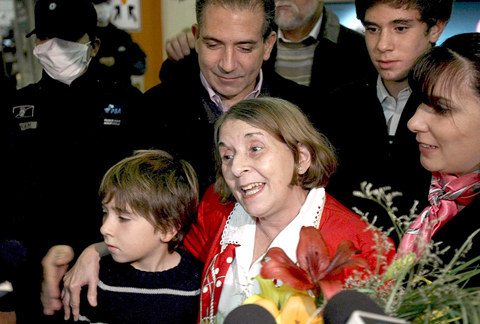A Cuban dissident surgeon said on Sunday that she harbors no grudge against former Cuban president Fidel Castro upon arriving in Argentina for an emotional family reunion after being denied permission to leave Cuba for more than a decade.
Desperate to see her ailing, 90-year-old mother, Hilda Molina said she wrote directly to Cuban leaders seeking permission to travel. On Sunday, she was able for the first time to hug her Argentine-born grandchildren, ages 13 and 8, and see her mother, who was allowed to leave Cuba months ago.
“I have inside a wound that will never heal,” Molina told reporters after meeting with her son for the first time in 15 years.

PHOTO: EPA
“I say to Mr Fidel Castro, who has been the scourge of my family, may he have all the peace in the world. May he choose the path that the country needs. I don’t need to forgive him for anything,” she said.
Cubans like Molina who dare to openly criticize Cuba’s system are often denied permission to leave the country. Cuba also restricts individual foreign travel by its physicians, saying it spends too much training them to allow them to emigrate for higher salaries elsewhere.
The surprise travel authorization, issued on Friday, was seen as a gesture of openness in the era after Fidel Castro ceded power to his brother, President Raul Castro, in 2006 for health reasons. It was also seen as a nod to Argentine President Cristina Fernandez, a Cuba ally who along with her husband and predecessor, Nestor Kirchner, had asked the Castros since 2003 to allow Molina to leave.
But Molina said her approval to travel in itself did not indicate broader changes by the Cuban government.
“That will be resolved when we Cubans do not have to ask permission to enter and leave the country,” she said. “There are 11 million Cubans whose rights are being violated.”
Molina, who once posed for high-profile photos with Fidel Castro, was a well-known physician at a government institution until 1994, when she resigned after questioning the ethics of using human stem cell tissue in studies on treating ailments like Parkinson’s disease. That same year her son left Cuba with his Argentine wife.
Molina’s travel documents are good for several months. She said she intends to return to Cuba, but not while her mother is in precarious health.
“I put it in the letter to Raul Castro ... that when I close the eyes of my mother I will return,” Molina said. “I want her to recover and to return together. But as long as she is in danger I am not going to abandon her.”

In the sweltering streets of Jakarta, buskers carry towering, hollow puppets and pass around a bucket for donations. Now, they fear becoming outlaws. City authorities said they would crack down on use of the sacred ondel-ondel puppets, which can stand as tall as a truck, and they are drafting legislation to remove what they view as a street nuisance. Performances featuring the puppets — originally used by Jakarta’s Betawi people to ward off evil spirits — would be allowed only at set events. The ban could leave many ondel-ondel buskers in Jakarta jobless. “I am confused and anxious. I fear getting raided or even

POLITICAL PATRIARCHS: Recent clashes between Thailand and Cambodia are driven by an escalating feud between rival political families, analysts say The dispute over Thailand and Cambodia’s contested border, which dates back more than a century to disagreements over colonial-era maps, has broken into conflict before. However, the most recent clashes, which erupted on Thursday, have been fueled by another factor: a bitter feud between two powerful political patriarchs. Cambodian Senate President and former prime minister Hun Sen, 72, and former Thai prime minister Thaksin Shinawatra, 76, were once such close friends that they reportedly called one another brothers. Hun Sen has, over the years, supported Thaksin’s family during their long-running power struggle with Thailand’s military. Thaksin and his sister Yingluck stayed

Kemal Ozdemir looked up at the bare peaks of Mount Cilo in Turkey’s Kurdish majority southeast. “There were glaciers 10 years ago,” he recalled under a cloudless sky. A mountain guide for 15 years, Ozdemir then turned toward the torrent carrying dozens of blocks of ice below a slope covered with grass and rocks — a sign of glacier loss being exacerbated by global warming. “You can see that there are quite a few pieces of glacier in the water right now ... the reason why the waterfalls flow lushly actually shows us how fast the ice is melting,” he said.

Residents across Japan’s Pacific coast yesterday rushed to higher ground as tsunami warnings following a massive earthquake off Russia’s far east resurfaced painful memories and lessons from the devastating 2011 earthquake and nuclear disaster. Television banners flashed “TSUNAMI! EVACUATE!” and similar warnings as most broadcasters cut regular programming to issue warnings and evacuation orders, as tsunami waves approached Japan’s shores. “Do not be glued to the screen. Evacuate now,” a news presenter at public broadcaster NHK shouted. The warnings resurfaced memories of the March 11, 2011, earthquake, when more than 15,000 people died after a magnitude 9 tremor triggered a massive tsunami that